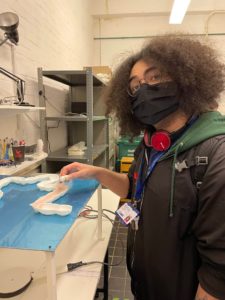Ethical challenges posed by new technologies call for wide societal debate. Students on this module engage these challenges including: problems of algorithmic bias and encoding implicit prejudice; the uncertainty of data values; transparency and accountability as machine learning creates and adapts its own algorithms thereby potentially putting AI decisions beyond human reckoning; whether persons will still really be themselves if their brain function has changed following a machine implant.
New technologies bring challenges but also opportunities. Here students visit the University of Exeter Applied Dynamics and Control Lab (https://blogs.exeter.ac.uk/adce/) where Dr Yang Liu and his team are pioneering a new self propulsion technique for small bowel endoscopy. (https://researchandinnovation.co.uk/pioneering-a-new-self-propulsion-technique-for-small-bowel-endoscopy/). The project is funded by EPSRC New Horizons (https://gow.epsrc.ukri.org/NGBOViewGrant.aspx?GrantRef=EP/V047868/1).
As Pope Francis says: “Artificial intelligence is at the heart of the epochal change we are experiencing. Robotics can make a better world possible if it is joined to the common good. Indeed, if technological progress increases inequalities, it is not true progress. Future advances should be oriented towards respecting the dignity of the person and of Creation.” Pope Francis, Prayer Intention, 5 November 2020
This module is a starting point for Theology and Religion students at visit the University of Exeter to consider some of the foundational issues in the ethics of artificial intelligence (AI) and robotics, looking into comparisons between the human brain and machine neural networks modeled loosely after the human brain, human consciousness and AI, before considering the impact of AI and robotics on societies in areas such as industry, social media, surveillance, the judicial system, education, and militarized conflict.



